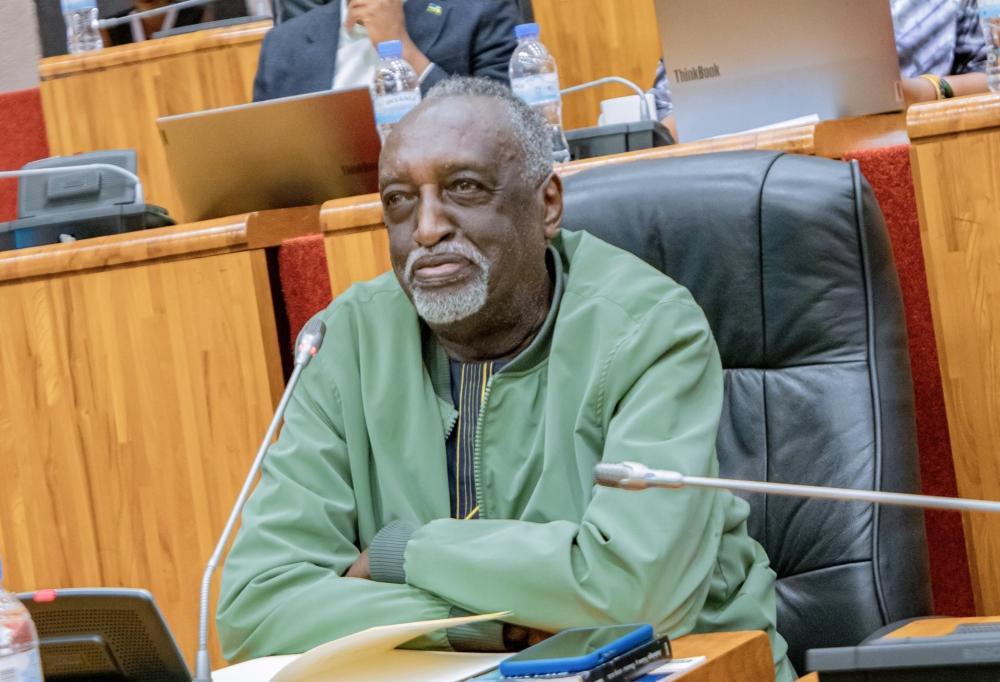Africa-Press – Rwanda. Despite some progress in Africa, the shadows of colonialism and imperialism continue to haunt the continent’s development, Tito Rutaremara, the Chairperson of Rwanda Elders Advisory Forum has warned. He said this during a parliamentary session held on Friday, May 23, to reflect on the continent’s progress and the challenges that persist.
Rutaremara emphasized the ongoing dominance of former colonial powers, warning that they continue to control global wealth and influence.
“The biggest challenge is the power of colonialists and imperialists, they still hold global wealth, and African countries must beg for aid. When we ask for help, they impose conditions. It’s as if they own the economy, and that mindset makes it nearly impossible to achieve African self-reliance,” he observed.
A joint session of the two houses of Rwandan Parliament on Friday, May 23.
He noted that even Africa’s education systems and belief structures are rooted in colonial foundations.
“We’ve inherited their education, their ideals. We aspire to live like them. In religion, the devil is portrayed as black, and God as white, these are the mental chains we still wear,” he argued, further highlighting the continent’s military inferiority and dependency on foreign approval for decision-making as Africa weaknesses.
“For instance, in the 1982s, when Libya and Chad were at war, the OAU summit was supposed to take place in Libya, but Western pressure forced 12 West African presidents to withdraw. Even now, African leaders seek validation from the West before taking action.”
He urged Africans to dismantle the mindset of servitude.
“We still enjoy the comfort of dependence. We lack political will. We need to embrace Pan-Africanism. We must raise leaders ready to fight for it, even die for it,” he emphasized.
Other speakers included Ambassador at Large in the Great Lakes Region, Amb Vincent Karega, and Protais Musoni, the Chairman of the Pan African Movement – Rwanda Chapter. They addressed the deep-rooted structural and ideological barriers that still constrain Africa’s growth.
Amb Karega emphasized that African integration remains largely rhetorical.
“Europe, which once colonized us, now enjoys a single market, a shared currency, and open borders. But in Africa, we still have borders,” he said, urging the African Union to give greater prominence to the Pan-African Movement (PAM), making it a driving force behind continental decisions.
“Despite Africa’s wealth in natural resources, the lack of value addition continues to limit economic sovereignty; we boast of oil and minerals, but rarely do we process them into finished products. Governance gaps, corruption, poor vision, and implementation, continue to cripple development in Africa,” he added.
Musoni revisited Pan-Africanism within a historical and ideological framework.
“Pan-Africanism was born from the pain of exploitation, the technological gap between Europe and Africa marked the beginning of centuries of oppression. They came with superior weapons, and we became their labourers, were dehumanized and commodified,” he said.
Tracing the journey from colonial conquest to modern underdevelopment, Musoni explained how Africans were robbed.
“Millions were taken as slaves. Those who remained were left weak. In return, we got beads and cloth. Infrastructure was built not for us, but to extract our resources. This continues today; we sell raw materials and buy finished products, we remain dependent,” he argued.
Musoni underscored that Pan-Africanism evolved from individual liberation to a collective call for dignity.
“By 1960, a wave of independence swept across the continent, as the first African countries broke free from colonial rule. Just three years later, on May 25, 1963, 32 independent nations, including Rwanda, gathered in Addis Ababa with a shared mission: to support the liberation of the remaining colonies and to lay the foundation for continental unity.”
He reminisced about Africa Day, which will be celebrated on Sunday, May 25, to mark the milestone moment in 1963 when African nations stood together in solidarity, launching a united front in the struggle for freedom, dignity, and self-determination.
For More News And Analysis About Rwanda Follow Africa-Press






